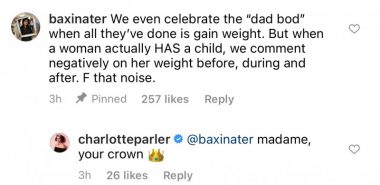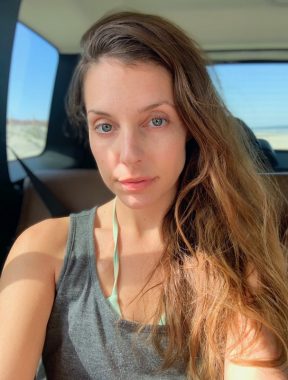Warning: This Column Should Trigger You (Because Thin Privilege Is Real)
I have thin privilege.
I’ve said this before and I’ll say it again: This is significant because only those who benefit from the system can help break the system — and it needs to be broken.
“I saw a comment on Instagram where someone pointed out how sexist the concept of dad bods can be,” I told my partner, who I often wish had even more of a dad bod. “We are basically celebrating men for fluctuating in weight. But if a woman literally creates life from her body, we analyze and hyper focus on her size before, during, and after.”
“Men get criticized for their bodies, too,” he immediately said, before realizing what he was doing (defending when he doesn’t need to).
“Have you ever heard the term mom bod as a positive?” I asked. “Even once?”
Saying we hold women’s bodies to unfair age, size, and circle-of-life standards doesn’t take away from how unfair it might feel to be a man on the same planet as Jason Momoa. We get it. It’s hard. But saying I have thin privilege and thus am treated better than my curvier counterparts in every instance of my day is just the truth. And that doesn’t negate pains or pressures I go through myself.

A recent screen grab from female activist Charlotte Parler’s Instagram. (Via @charlotteparler)
“I hate being called too thin,” we say as sick people, or, “I wish I could gain weight.” Sure, that’s all true. Being teased for any size or stature is ridiculous and wrong and rampant, and none of us should talk about numbers out loud when it comes to our bodies (like, at all, so stop doing it). But it’s still not the same as facing fat-phobia at large.
“Have you ever seen a plus size section in Target for men?” I asked a friend the other day. “I mean, I know they have the occasional Big & Tall stores, but your plus sizes are integrated right into the same section. We have to go to a completely different section of the store, in nearly every store, as if to say, ‘You are different. Stand apart.’ I never see men face the same.”
“Women get twice as much store, though,” he said, before listening and admirably changing his tune later on. “We only get one small section.”
“Maybe if you bought new clothes since 1995 you’d get more store,” I replied coldly. (It’s not our fault we have to support an entire economy on our fragile shoulders.)
An issue doesn’t have to be about us for us to care, and it doesn’t take away from our own struggles to stand up and say: “This is wrong.” But the wrong perspective will say that it does.

“The face I give someone who says hunger is worth it, so long as we’re thin.” (Photo by Bailey Anne Vincent)
I have thin privilege because I can wear a fast fashion dress from Shein to a fancy formal event, and when asked where it’s from, coyly reply, “It was only $18.” I can do that because the world caters to me. I am the center of attention. I am a store’s sick little dream.
Yes, I have scars and tubes and stomach acid betwixt every outfit, but that’s not the same. Being sick and “metaphorically dying” is not as hard as being fat in America, plain and simple.
And you might be thinking, “But do you really need to be the poster child for this subject?” And the answer is, “No, I needn’t be.” But I can still care about something when it’s not about me. And how can we say it’s “not about us” when 85% of the dialogue, demand, and measure of worth in Western spaces is based around a woman’s body to begin with? This is all of us. We all need to care.
You know that phrase, “Nothing tastes as good as thin feels?” It’s a lie. Take it from someone who’s living it firsthand, even when she doesn’t want to. Too thin feels cranky and erratic. It feels exhausted and manic. It feels weak. And more of us need to talk about this and break the busted image that sample size solves everything. Bodies are meant to age and evolve and grow, and mom bods should be just as revered as dad bods. Or better yet, not written about at all. (Sorry. Already failing at that part.)
The sick, sad truth is that life is easier at a smaller size, even when we are sick and sad.
We receive more praise. We “look better” in everything we wear. Or at least that’s the lie we believe. Inside me, deep down, beneath the body-positive Artistic Director status, and the rage at how often we equate the words “body positive” with “not as good” or “a little less talented,” is a sick, brainwashed demon who still thinks that not having to wear a bra when she jumps up and down is easier than evolving over time. Growing into herself. Being allowed to change.
How do we create change if we can’t change?
We can’t.
And that’s a problem.
***
Note: Cystic Fibrosis News Today is strictly a news and information website about the disease. It does not provide medical advice, diagnosis, or treatment. This content is not intended to be a substitute for professional medical advice, diagnosis, or treatment. Always seek the advice of your physician or other qualified health provider with any questions you may have regarding a medical condition. Never disregard professional medical advice or delay in seeking it because of something you have read on this website. The opinions expressed in this column are not those of Cystic Fibrosis News Today, or its parent company, Bionews, and are intended to spark discussion about issues pertaining to cystic fibrosis.









Leave a comment
Fill in the required fields to post. Your email address will not be published.